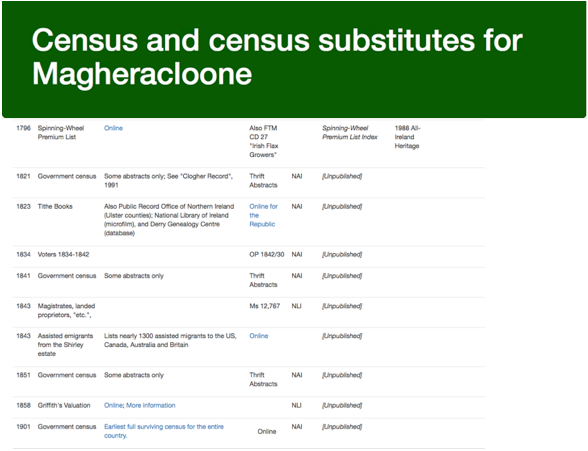Irish Census Substitutes
- moughty

- May 13, 2019
- 3 min read
The issues with the Irish census are frustrating to say the least! Is there any place you might find your ancestors in 19th century records? As I’ve said before, it all depends on time and place. Just like the US 1890 census, there are fragments of the 1821-1851 censuses that survived the fire. The destruction of the 1861-1891 censuses, however, was complete.
The surviving fragments have been indexed and are online at the National Archives. If you select the 1821 census, then view the drop down list of counties, you’ll see only those counties listed that have some surviving records.

Before you get too excited, the entire county didn’t survive, and in some cases a complete parish doesn’t survive. One of the best places to start your research is with John Grenham’s Tracing Your Irish Ancestors. Go to the section on your county and check his chronological listing of resources. For example, Fermanagh lists:
1821 Parishes of Derryvullan and Aghalurcher (part only)
If you’re lucky and your ancestor was in one of the places at that time, you may find a record for him. Using John Grenham’s website, in conjunction with his book will give you an excellent listing of what might be available. I struck out on census fragments…none in the areas of my ancestors.
You might notice another listing at the National Archives…Census Search Forms 1841-1851. (These records are also available at FindMyPast.) Since those censuses were destroyed, what’s there? When the Old Age Pension Act was introduced in Ireland in 1908, eligibility was set at 70 years old and applicants had to prove their age. To be eligible, they would have been born before civil registration which didn’t start until 1864. How could they prove their age? One way was by being identified in either the 1841 or 1851 census which wasn’t destroyed until 1922. The applicant would complete a form with their name, residence at the time of the census, their approximate age, and parents’ names. The request was sent to the Public Records Office for research. I came across the form below for my great grandmother’s brother. I didn’t know what had happened to him and he popped up in a search. I know it’s the correct person based on the location and names of his parents. Notice on the line “Return searched by” is NF or not found. Of course he wasn’t found…he wasn’t born until 1867! But I found out that in 1916 he lived in Belfast, was married to Letitia, and with this information was able to find his marriage record, and both of their death records.
If the information was found, the entire family was written down (sometimes the information was written on the back of the form, but only the front was imaged). In some cases you’ll see the transcription of the information. On the example below, James Daly had requested the information. The family had been indexed as “Dawley” but James appeared as 4 years old, along with his parents,Daniel and Margaret and his siblings, Julie and Mary. If the individual was not found, at least you have the names of the parents and the location.
Ancestry has two databases (one for Northern Ireland and one for the Republic that were taken from books by Josephine Masterson, and published by Genealogical Publishing Co. in 1999: Ireland, 1841/1851 Census Abstracts (Northern Ireland) and Ireland: 1841/1851 Census Abstracts (Republic of Ireland). Notice that the claimant is indicated, as well as the maiden and/or married names of the women. The records for the six counties of Northern Ireland are also on microfilm at the Public Records Office of Northern Ireland
Church of Ireland Parish Record Search Forms are another way to prove age and these are available at FindMyPast. Since almost two-thirds of the Church of Ireland Registers were destroyed in the 1922 fire, they can also be an excellent source. Here we have the baptism of Glasgow Johnston in 1845 in Rossinver Parish in Leitrim, listing his parents as Arthur and Barbara. I did have Arthur’s name from Glasgow’s marriage record, but Barbara was a new addition. The Rossinver Parish Registers were destroyed in the fire, and the oldest surviving records date to 1876. I searched by just the parish…no individual for a list of all of the records that survived for the parish (total of 77).
So it is a matter of luck. These records can be a goldmine if your ancestors were in the right place at the right time. Check them out to see what you can find.
Happy Hunting!
Today's the last day to take advantage of some of the Mother's Day DNA Offers.
Interested in researching in Ireland in October? There are still some slots available.








Comments